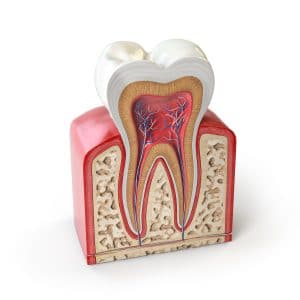
A root canal is often maligned as an uncomfortable procedure. However, in reality the treatment is safe, comfortable, and crucial for avoiding tooth loss and painful symptoms due to infection or abscess. In today’s blog, your Astoria, NY, dentist will talk about repairing and restoring teeth with our root canal treatment.
The Root Canal Procedure
We begin by administering a local anesthetic around the tooth undergoing treatment, ensuring your comfort throughout the proceedings. Next, we open the tooth itself to remove the infected tissue from within. Afterward, we clean the interior of the tooth thoroughly and add a restorative material known as gutta percha. The final step involves capping the tooth with a custom-made dental crown, which covers the entire visible portion and protects it from further injury or infection. The crown is often created from lifelike materials, such a ceramic, which provides a lifelike appearance and blends with the rest of your smile. The entire procedure sometimes takes as little as one visit to complete.
Infections and Dental Abscesses
How do you know if you have a tooth that needs a root canal? Well, an infection or abscess occurs when harmful bacteria come into contact with the inner pulp, which could occur as a result of an untreated cavity or possibly a cracked or chipped tooth. People then experience pain when biting down, toothaches and tooth sensitivity, swelling near the aching tooth, or even a discharge from the tooth itself. Undergoing treatment at this point is crucial for avoiding the loss of the tooth and the spread of infection to surrounding teeth.
Protecting Your Teeth From Further Infections
To reduce the risk of damage, be sure you wear a mouthguard when playing sports or engaging in other activities that could lead to chipped or cracked teeth. To lower the risk of cavities, cut back on sugary foods and drinks and make time to see us every six months for a checkup and cleaning. We can monitor the smile for signs of a cavity and then provide treatment if we discover anything. A cleaning removes all plaque to help protect the smile from cavities. At home, you should take time to brush your teeth for two minutes twice a day, and always floss thoroughly before going to bed each night. If you have any questions about avoiding decay or preventing your tooth from becoming infected, then contact our team today. Let us know if you begin to experience any of the warning signs discussed in today’s blog!
Do You Have Questions About Restorative Dentistry?
If you have any questions about repairing smiles or preventing poor oral health, then please talk to our team today. For more information on our treatments for infected teeth, then schedule a consultation, call Jeffrey Leibowitz, DDS, in Astoria, NY, today at 718-728-8320.


